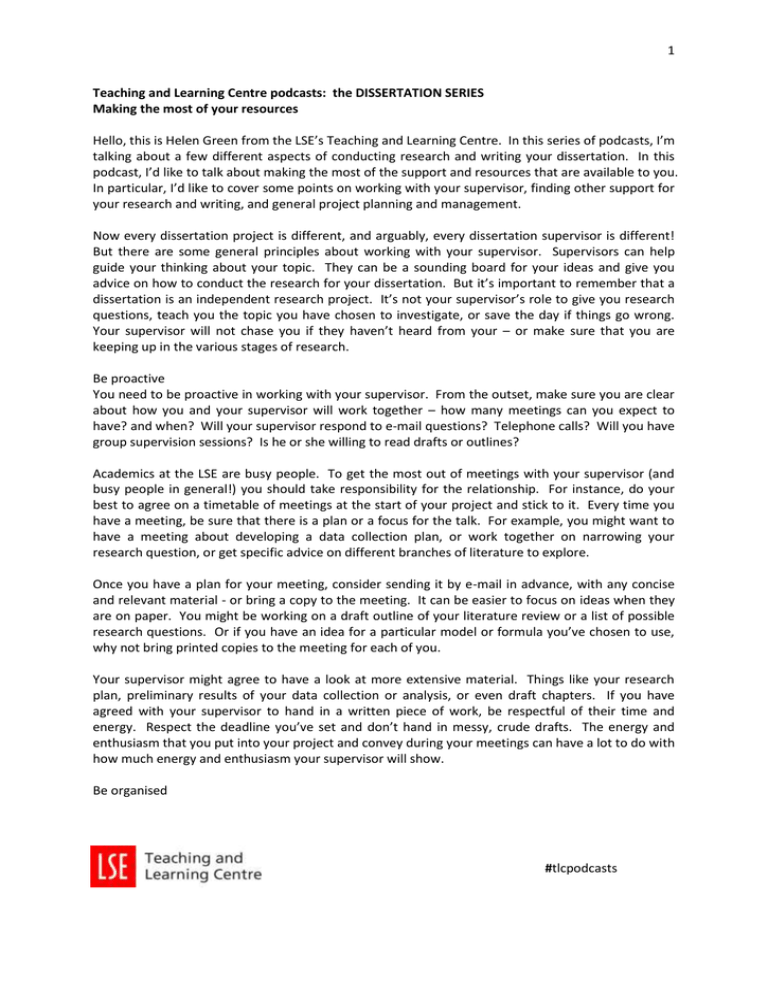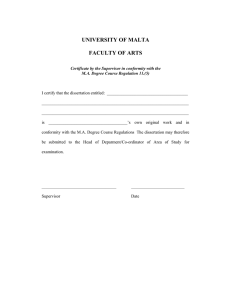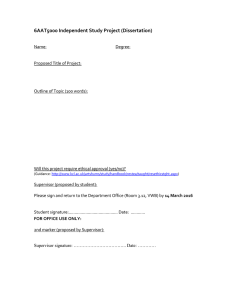1 Hello, this is Helen Green from the LSE’s Teaching and... Teaching and Learning Centre podcasts: the DISSERTATION SERIES
advertisement

1 Teaching and Learning Centre podcasts: the DISSERTATION SERIES Making the most of your resources Hello, this is Helen Green from the LSE’s Teaching and Learning Centre. In this series of podcasts, I’m talking about a few different aspects of conducting research and writing your dissertation. In this podcast, I’d like to talk about making the most of the support and resources that are available to you. In particular, I’d like to cover some points on working with your supervisor, finding other support for your research and writing, and general project planning and management. Now every dissertation project is different, and arguably, every dissertation supervisor is different! But there are some general principles about working with your supervisor. Supervisors can help guide your thinking about your topic. They can be a sounding board for your ideas and give you advice on how to conduct the research for your dissertation. But it’s important to remember that a dissertation is an independent research project. It’s not your supervisor’s role to give you research questions, teach you the topic you have chosen to investigate, or save the day if things go wrong. Your supervisor will not chase you if they haven’t heard from your – or make sure that you are keeping up in the various stages of research. Be proactive You need to be proactive in working with your supervisor. From the outset, make sure you are clear about how you and your supervisor will work together – how many meetings can you expect to have? and when? Will your supervisor respond to e-mail questions? Telephone calls? Will you have group supervision sessions? Is he or she willing to read drafts or outlines? Academics at the LSE are busy people. To get the most out of meetings with your supervisor (and busy people in general!) you should take responsibility for the relationship. For instance, do your best to agree on a timetable of meetings at the start of your project and stick to it. Every time you have a meeting, be sure that there is a plan or a focus for the talk. For example, you might want to have a meeting about developing a data collection plan, or work together on narrowing your research question, or get specific advice on different branches of literature to explore. Once you have a plan for your meeting, consider sending it by e-mail in advance, with any concise and relevant material - or bring a copy to the meeting. It can be easier to focus on ideas when they are on paper. You might be working on a draft outline of your literature review or a list of possible research questions. Or if you have an idea for a particular model or formula you’ve chosen to use, why not bring printed copies to the meeting for each of you. Your supervisor might agree to have a look at more extensive material. Things like your research plan, preliminary results of your data collection or analysis, or even draft chapters. If you have agreed with your supervisor to hand in a written piece of work, be respectful of their time and energy. Respect the deadline you’ve set and don’t hand in messy, crude drafts. The energy and enthusiasm that you put into your project and convey during your meetings can have a lot to do with how much energy and enthusiasm your supervisor will show. Be organised #tlcpodcasts 2 Don’t expect your supervisor to remember what was said at the last meeting! It is up to you to keep a record of what you discuss and decide in supervisory sessions. At the beginning of each meeting, remind your supervisor of any suggestions or decisions made in the last meeting and let him or her know what progress you’ve made or any problems you’ve encountered since then. At the end of each meeting, try to agree on a few points about what you should do next and when you’ll meet again. Be positive If your supervisor is critical about your research questions, your research instruments, the methods you propose, or draft texts, try NOT to take it personally. Remember that discussing and debating research is an everyday part of academic life. Your professors themselves go through this kind of critique when they apply for funding or when they submit articles for publication. Try to be positive and accept critique in a constructive way. Be sure you understand what your supervisor’s reservations are, and be clear about the ways you can improve or further develop your ideas. Don’t avoid your supervisor – because your ideas are not ready yet. This can quickly become a destructive cycle! First, you feel a bit stuck, instead of asking for help – you avoid your supervisor. Then it becomes too late to get any help. If you are feeling stuck, take some time to think and write about what seems unclear - then discuss these ideas to your supervisor. That’s when they can be of most support. Research, by its very nature, can be unpredictable. If you come across an unexpected issue – say your data collection is not going to plan, or your analysis is throwing up a surprise – do your best to analyse the situation and understand what the problem is and how it arose. If it’s a serious issue, try to arrange to meet with your supervisor as soon as possible! Asking for help is not a sign of failure; collaboration is part of research! In sum, be proactive, organised, and positive in your work with your supervisor. Of course, your dissertation supervisor is not your only source of support. Dissertations are independent projects – and this means that it is up to seek and find the resources you need. Now it’s not feasible to cover all the possibilities – but here are a few. In my podcast about searching and reviewing the literature, I mentioned the LSE Library academic support librarians. Each department has one! These are information specialists who are skilled and experienced in the research processes you are expected to use and master – from searching the literature, to using reference management tools to stay organised, to maintaining academic integrity in your writing – and this means using others’ ideas effectively and transparently WITHOUT plagiarising. Do get in touch with your department’s specialist librarian! The LSE is lucky to have two Royal Literary Fund Fellows who will read your written work and discuss with you your writing style and structure – and the flow of your text. They are professional writers, so are well-placed to talk about the actual writing process, too. Ways to find inspiration, methods to get your ideas on paper, approaches to editing and improving your texts. These are all areas where the “RLF” can help. You can arrange a meeting during term time via TLC by e-mailing studentsupport@lse.ac.uk. #tlcpodcasts 3 The TLC also has study advisers, who are researchers and teachers, who are ready to help you with your dissertation. This can range from planning your project to structuring your dissertation, writing a clear abstract or formulating clear research questions. Again, meetings with TLC’s study advisers are available during term time, and you can arrange one by sending a message to studentsupport@lse.ac.uk. For specific issues around research methods, LSE’s Methodology department offers a walk-in surgery for specific questions – about both qualitative and quantitative methods. No appointment is required. You can find out where and when these term-time surgeries take place on the LSE Methodology Department webpage. If you’re lucky, you’ve already developed a study group at this stage. Where there is the potential to develop constructive and reciprocal working relations, call of your peers! Remember that many of your fellow students are both willing and very able to listen and react to your ideas, and give feedback on the clarity of your writing. After all, some of these people are likely to be part of your social and professional network in future. Time management and planning Now, you might have noticed how many times I’ve mentioned “term-time”. And that brings me to my last point. Part of the skill of doing a research project and handing in a dissertation by the deadline is managing your time – and this means planning. For example, when support or supervision is available during term-time, this means that it is not possible to get help during the Easter Break or after Summer Term is over. Be sure you know the dates of the Lent Term and Summer Term and that you plan to use your time wisely! So in the Lent Term, this means making time for coursework and assignments PLUS dissertation work before the end of term. For the Easter Break, it might mean planning for both exam revision AND data collection - or some other dissertation-related work. During the Summer Term, you’ll might have to deal with taking exams AS WELL AS meeting with your supervisor. I highly recommend making an overall plan that include term dates, exam dates, any work or family obligations you may have. Based on this, you can then make a detailed research plan – with specific tasks and milestones. This is one of the things that would be good to discuss with your supervisor early on. In the materials available to download with this podcast, I’ve included a checklist of dissertation tasks to help you plan your work from now until your dissertation deadline. I hope this has been helpful – and I hope you’ve enjoyed the series. Thanks very much for listening. We’d love to hear your comments and critiques about these podcasts, so please do send us your feedback, by using the online feedback box, or drop us a line at tlc@lse.ac.uk. I wish you the best with your dissertation! #tlcpodcasts

